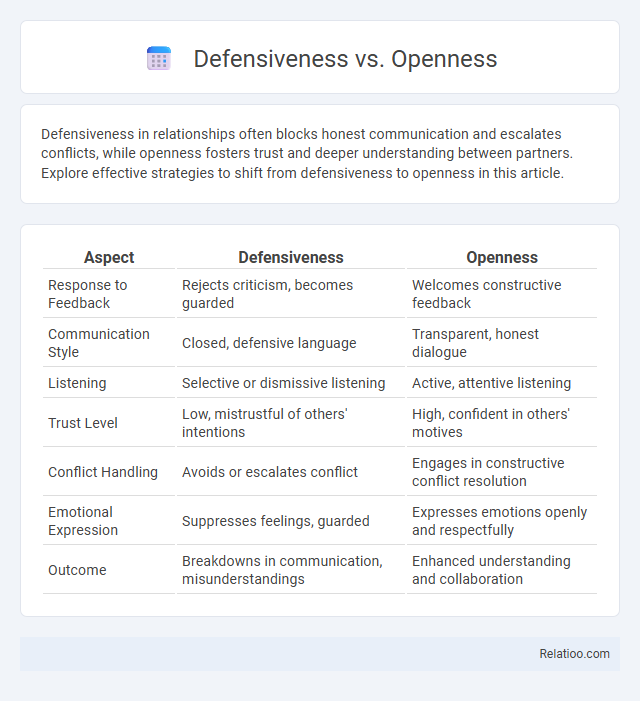Defensiveness in relationships often blocks honest communication and escalates conflicts, while openness fosters trust and deeper understanding between partners. Explore effective strategies to shift from defensiveness to openness in this article.
Table of Comparison
| Aspect | Defensiveness | Openness |
|---|---|---|
| Response to Feedback | Rejects criticism, becomes guarded | Welcomes constructive feedback |
| Communication Style | Closed, defensive language | Transparent, honest dialogue |
| Listening | Selective or dismissive listening | Active, attentive listening |
| Trust Level | Low, mistrustful of others' intentions | High, confident in others' motives |
| Conflict Handling | Avoids or escalates conflict | Engages in constructive conflict resolution |
| Emotional Expression | Suppresses feelings, guarded | Expresses emotions openly and respectfully |
| Outcome | Breakdowns in communication, misunderstandings | Enhanced understanding and collaboration |
Understanding Defensiveness: Definition and Signs
Defensiveness is a psychological response where Your mind protects itself from perceived criticism or threat, often manifesting through avoidance, denial, or blame-shifting. Key signs include emotional reactions like anger, withdrawing from conversations, or minimizing feedback, which hinder open communication and problem-solving. Understanding these indicators helps foster greater openness, reducing conflict and improving interpersonal relationships.
What Openness Really Means in Communication
Openness in communication means embracing honesty, vulnerability, and active listening to foster genuine understanding and trust. It contrasts with defensiveness, which often manifests as denial, blame, or withdrawal that hinders honest dialogue and escalates conflict. Your ability to practice openness encourages meaningful connections and resolves misunderstandings effectively.
The Psychological Roots of Defensiveness
Defensiveness often stems from deep psychological roots such as fear of judgment, low self-esteem, and unresolved past trauma, which trigger protective mechanisms in your mind. Openness, in contrast, arises from psychological resilience, self-awareness, and a secure attachment style that fosters trust and vulnerability. Understanding these mental frameworks can help you recognize patterns of defensiveness and promote healthier interpersonal relationships.
Benefits of Embracing Openness
Embracing openness enhances effective communication by fostering trust and reducing misunderstandings in interpersonal relationships. It encourages personal growth and adaptability by promoting a willingness to accept feedback and new perspectives. Openness also cultivates a collaborative environment, leading to increased creativity and problem-solving capabilities within teams.
Defensiveness vs Openness: Key Differences
Defensiveness occurs when individuals respond to perceived threats by protecting themselves, often through denial or blame, which blocks communication and hinders problem-solving. Openness, in contrast, involves a willingness to listen, accept feedback, and engage in honest dialogue, promoting understanding and collaboration. Your ability to choose openness over defensiveness fosters stronger relationships and more effective conflict resolution.
Impact of Defensiveness on Relationships
Defensiveness in relationships often triggers communication barriers and escalates conflicts, hindering emotional connection and trust development. Openness fosters vulnerability and understanding, promoting healthier interactions and mutual support. Persistent defensiveness can erode intimacy, leading to misunderstandings and dissatisfaction, emphasizing the importance of cultivating openness for relationship longevity.
How Openness Fosters Trust and Growth
Openness fosters trust by encouraging transparent communication and vulnerability, allowing Your relationships to deepen and evolve. When individuals practice openness, defenses lower, creating a safe environment for honest feedback and collaborative problem-solving. This dynamic nurtures personal and professional growth by promoting mutual understanding and resilience.
Overcoming Defensiveness: Practical Strategies
Overcoming defensiveness involves cultivating openness through active listening, self-awareness, and empathy to reduce emotional barriers in communication. Practicing mindfulness techniques and reframing criticism as constructive feedback fosters a more receptive mindset, encouraging growth and collaboration. Establishing trust and maintaining a non-judgmental attitude further diminish defensive reactions, promoting effective interpersonal relationships.
Cultivating Openness: Tips for Everyday Life
Cultivating openness in your daily life enhances communication, fosters empathy, and strengthens relationships by reducing defensiveness. Embrace active listening, practice curiosity about others' perspectives, and respond with thoughtful, non-judgmental feedback to create a safe environment for sharing. Your commitment to openness transforms conflicts into opportunities for growth and deepens mutual understanding.
Choosing Openness Over Defensiveness: The Path Forward
Choosing openness over defensiveness enhances communication by fostering trust, empathy, and collaboration in your relationships. Openness allows you to embrace feedback and understand diverse perspectives, which drives personal growth and team cohesion. Prioritizing openness creates a positive environment where challenges become opportunities for learning rather than conflict triggers.

Infographic: Defensiveness vs Openness
 relatioo.com
relatioo.com